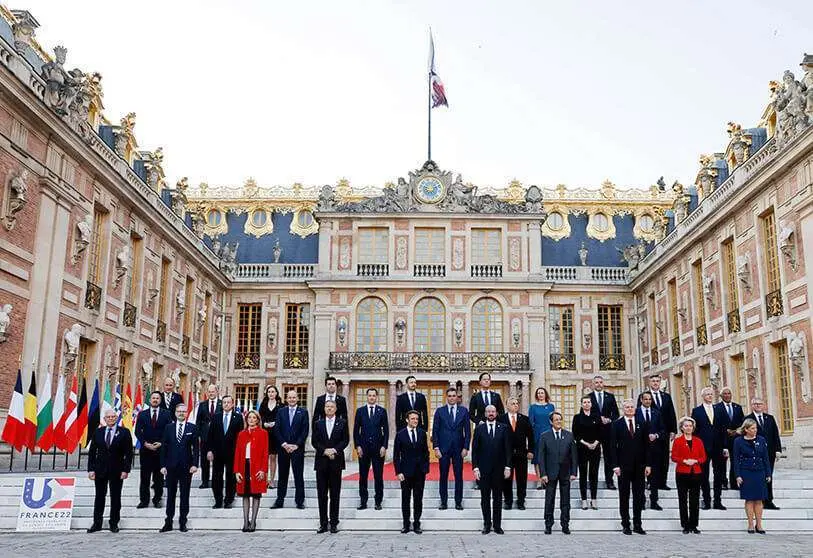European Union leaders meet in Versailles to discuss the Ukraine issue

Last Thursday, the 27 heads of state and government of the European Union met at the Palace of Versailles to discuss Ukraine's request for accelerated integration into the bloc. French President Emmanuel Macron was in charge of welcoming all his European counterparts on this first day of dialogue.
After nine hours of talks, the leaders reached an agreement on Zelensky's "European aspirations", but did not go any deeper into the process. The conflict between Kiev and Moscow has fostered unity among all the bloc's nations, but they are divided over the speed of the process.

For now, Kiev only has an Association Agreement that aims to open its markets and bring them closer to Europe. It also includes a far-reaching free trade pact and assistance for the modernisation of the Ukrainian economy. Charles Michel, President of the Council of the EU, says this is "an opportunity to show strong and unwavering support for Ukraine, i.e. to commit financially and materially".
Eastern European countries have strongly supported the fast-track bid, but are aware that the process could take a long time and requires unanimity among all member states. Mark Rutte, Prime Minister of the Netherlands, says that "there is no such thing as a fast track, fast-track procedure".

There are several factors that prevent a hasty decision. Some Western Balkan territories, such as Albania or Macedonia, have been working for decades to become a candidate only. Macron also alluded to the clause in the EU treaty that makes it obligatory for other countries to intervene if one of the members is suffering armed aggression.
Other issues addressed at the meeting included freeing the bloc from its energy dependence on Russia and strengthening its defence capabilities. All leaders agree that imports of Russian gas, oil and coal should be reduced while accelerating the transition to renewable energy.

The Associated Press states in a draft of the summit's conclusions that leaders will agree to strengthen investment in "innovative technologies", and continue efforts to make Europe "a stronger and more capable security provider".
Moscow supplies almost 40 % of the gas used to generate electricity, heat homes and supply industries in the European Union. The Kremlin receives some 600 million euros a day from the energy sector, making it its main source of income.
The European Commission proposed diversifying natural gas supplies and accelerating the development of green energy in order to reduce Russia's gas demand by two-thirds by the end of this year. However, the timeframe proposed by the institution seems unrealistic for many of the bloc's members.
Equally, they are unlikely to endorse a total embargo on Russian oil and gas imports. Italy and Germany call such a measure radical as they are much more dependent on Russia than other territories. Poland gets 67% of its oil from Moscow, while Ireland receives only 5%.

The 27 have agreed to increase the list of sanctions against the Kremlin, including the removal of all its banks from the SWIFT financial system. New oligarchs join the list of leaders targeted by Western condemnation. Belarus, in turn, is to be penalised for its support for Vladimir Putin.
These sanctions are beginning to have their first effects. The International Monetary Fund (IMF) warns that the Russian economy could enter a deep recession. Kristalina Georgieva, the IMF's managing director, argues that "Russia's bankruptcy is no longer an unlikely event".








